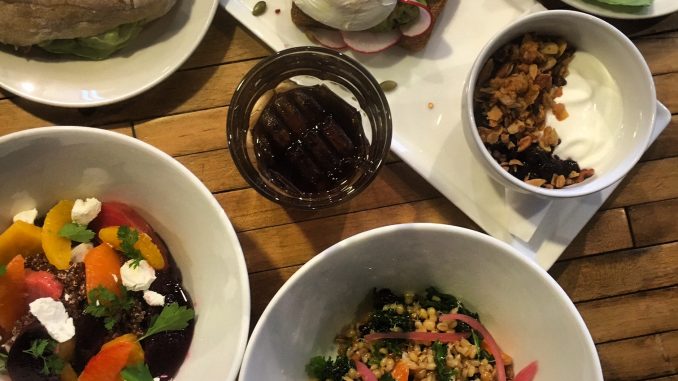
Inspired by cafes in Australia, Matt and Bruce Milletto expand Water Avenue Coffee’s food program into sophisticated format
Cafes in the United States still have a long way to go in terms of food ”typically a cafe serves coffee, and restaurants serve food, and never the twain shall meet. Other than pastries and bagels, menus in even some of the most revered coffeehouses in the U.S. have been limited and often feel like an afterthought.
After visiting Australia several times, father-son owners of Portland, Ore.’s Water Avenue Coffee, Bruce and Matt Milletto, knew they wanted to expand the company’s food menu. They faced a few challenges: a small kitchen space, for one, and perhaps even more daunting, a clientele that, unlike Australia’s, simply isn’t used to getting high quality, freshly prepared food.
The enlisted the help of veteran chef Ryan Kennedy to develop the menu. “The menu at Water Avenue offers seasonal and simplistic food,” says Ryan. “Utilizing farmer’s market-inspired dishes, [our] vision is to support farmers who farm using sustainable agriculture.”

Matt explained how he and Bruce approached the expansion thoughtfully, and how, since it debuted just over a week ago, it’s already earning rave reviews from customers. What’s more, Matt says it was easier than one would think.
Barista Magazine: What was the inspiration for expanding the menu?
Matt Milletto: Bruce and I have felt that a well-rounded food program is often essential to a great retail coffee business for many years. It was not possible in our current space until we opened our larger production roastery last September. We now have the ability to dive into a well-curated menu inspired by our travels around the world. I’ll never forget touring coffee bars in Australia years ago and falling in love with the food served in even the small retail coffee bars.

BM: When you were in the planning stages, what were your primary considerations? I.e. keeping price low, how to compete with nearby lunch spots, etc.
MM: We wanted to truly develop our entire menu around authentic Oregon ingredients, and keep things hyper local, fresh, affordable, and simple. We have limited kitchen space and did not want to open a restaurant, and our menu revolves around two induction burners, a Polyscience Sous Vide circulator and a soon to arrive ventless convection oven. We have two great lunch spots in our building, Bunk Sandwiches and Boke Bowl (Portland style ramen) so we did not want to compete with them. Rather, we wanted to fill [a need for] quick and healthy breakfast-inspired food. Our menu is 90% vegetarian by default really, as our food is pretty delicate and we do not want to influence overpowering aromas into the coffee bar environment.

BM: What is the size in square feet of the kitchen?
MM: We have a small galley style food prep area, dish pit with a pass-thru window, which is around 200 sq. ft.
BM: Knowing you had a limited size kitchen, how did you still manage to create such a creative and diverse menu?
MM: It does not take a big space to produce great food. Each dish we offer is mindfully created to work within our limitations. It’s food that we want to eat, and that is non-existent in our neighborhood. The menu is designed to be filling and satisfying but it’s more of an accompaniment to our coffee program vs. your big meal for the day. Our chef, Ryan Kennedy, and our team have been working on this concept and menu inspiration for a year or so, and we knew what we wanted to create.
BM: How would you describe the menu?
MM: Fresh, simple, clean dishes. Most coffee bars serve great coffee, but then mostly carb heavy pastry oriented food menus. Most people don’t want to eat a pastry every morning, and we have again created food that we want to eat alongside our perfectly executed coffee and espresso program.
RYAN + MATT’S TIPS FOR LAUNCHING A CAFE FOOD MENU
1. Base your menu on the equipment and size of space available. Do not try to be a restaurant with a huge menu, keep it simple. Also, buy the right equipment, often new with warranty
2. Satisfy a social need and offer food that your customers want. As a retail coffee bar, coffee is what drives people in on a daily basis, but often people want something to eat as well. Cater to the needs of your neighborhood and customer demographic.
3. Be mindful of service flow and prep times. Ideally, you want any item on the menu to be finished and plated 3-7 minutes from ordering. I recommend also offering a number of pre made items that are ready to eat, i.e. salads, yogurts and sandwiches that can be taken to go.
4. Understand cost of goods, waste and portion control. If you are offering high quality food, you will need to charge appropriate prices. Know what everything costs, and hire a chef/kitchen manager to help control all of these variables if needed. The goal is to continue to raise your ticket average by offering much more to your customers, so track this info and sales by category to ensure you are profitable.
5. Build an atmosphere for your employees that creates team. Unify your staff and educate them on the changes. We do this by having the kitchen staff interact with our guests when taking food out to them.




What is your portland, or. Address. Food looks delicious!
Hi Gwen,
You can find Water Ave here: 1028 SE Water Ave #145, Portland, OR 97214